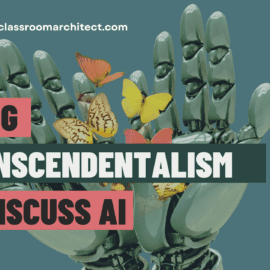Teaching Transcendentalism and wondering how you can make it relevant for your students? The early intellectual leaders of the movement feel far removed from their technology infused life. But, what if the spirit of transcendentalism that Whitman, Emerson, and Thoreau wrote is embedded in the childhood game that many of our students spent hours playing? There are a surprising number of opportunities for teaching transcendentalism with Minecraft from the goal and gameplay to the intriguing story of Julian Gough.
In this post I’ll share some ideas for how to tap into students’ nostalgia for a favorite video game to build the base for discussions about transcendentalism tenets which can then lead into conversations about copyright and intellectual property.

Table of Contents
What is it about Minecraft?
Minecraft is a renowned sandbox video game, celebrated for its limitless creativity and exploration. Developed by Markus Persson and his company Mojang Studios, Minecraft has become a global sensation, captivating millions of players of all ages with its endless possibilities and immersive gameplay.
Our students are very familiar with the game and it is part of their collective American childhood. My daughter, now a high school student, did not spend much time playing in elementary/middle school, but she enjoyed watching player walk-throughs on YouTube. Recently I gave my class a project with creative options and one class chose to build their final project in Minecraft. Many of our students spend hours immersed in the world-building game, but even those that did not actively play will be familiar with it.
Description of Minecraft:
In Minecraft, players find themselves in a vast open world, composed of various biomes, from lush forests to towering mountains, sprawling deserts to serene oceans. Armed with a trusty pickaxe and their wits, players navigate this pixelated universe, gathering resources, crafting tools, and building structures with virtual blocks of different materials. It is a game of boundless creativity, where the only limits are the players’ imagination and ingenuity.
But Minecraft is more than just a construction simulator. What sets Minecraft apart is its unique blend of exploration, creation, and survival. It offers players a sense of agency, enabling them to shape the world according to their whims and desires. From building towering castles to intricate redstone contraptions, players have the freedom to craft entire civilizations or embark on solitary quests of self-discovery. It is a playground of limitless possibilities, where every block placed is an expression of the player’s creativity and vision.
Is Teaching Transcendentalism with Video Games Really Possible?
Yes, video games can indeed embody the spirit of transcendentalism. While the historical transcendentalist movement predates the existence of video games, the core principles and ideals of Transcendentalism can find resonance within the medium.
Individualism and Self-Reliance: Video games often provide players with opportunities to make choices, shape their own paths, and solve problems independently. Games that encourage player agency, personal growth, and decision-making can align with the spirit of individualism and self-reliance advocated by transcendentalism.
Connection with Nature: Transcendentalism celebrates the relationship between individuals and the natural world. Some video games, particularly those set in expansive open-world environments, allow players to explore and interact with virtual landscapes that mirror elements of nature. These games can provide immersive experiences that evoke a sense of wonder, connection, and appreciation for the virtual environments, fostering a connection with nature in a virtual context.
Quest for Spiritual Growth: Transcendentalism encompasses a search for spiritual truth and personal growth. Similarly, video games often feature narratives that revolve around character development, moral dilemmas, and existential questions. Video games can provide players with opportunities for introspection, ethical decision-making, and personal growth, paralleling the transcendentalist pursuit of spiritual and intellectual enlightenment.
Escape from Conventional Society: Transcendentalists often criticized societal constraints and sought alternative modes of living. Video games, as immersive and interactive experiences, offer players an escape from the limitations and expectations of the real world. By providing virtual realms to explore, games can facilitate a temporary departure from conventional societal norms and allow players to envision and experiment with different possibilities and lifestyles.
Transcending Boundaries: Transcendentalism seeks to transcend societal boundaries, hierarchical structures, and conventional thinking. Video games, as a medium, can transcend physical, temporal, and spatial limitations, enabling players to inhabit different personas, explore diverse worlds, and challenge established norms. In this way, video games can encourage players to think beyond conventional boundaries and explore new perspectives and possibilities.
Opportunities to Discuss How Culture Has Changed
While video games can be a great tool for teaching Transcendentalism because they can align with the transcendental spirit, there are aspects of the medium that may contradict or challenge transcendentalist ideals.
- Escapism and Distraction: Transcendentalism encourages individuals to engage deeply with their surroundings and cultivate a meaningful connection with nature and self. Some video games, particularly those focused on escapism and entertainment, may prioritize providing quick thrills, distractions, and superficial experiences rather than fostering introspection or profound connections. Ask students – do the connections built bring users closer to nature and to self? Or does it create an artificial environment where players are separated from reality?
- Competitive and Materialistic Focus: Transcendentalism emphasizes individual growth, spiritual exploration, and the pursuit of truth and authenticity. However, certain video games, especially those centered around competitive multiplayer experiences or materialistic objectives, may prioritize winning, material rewards, and external validation over introspection, self-reflection, and personal growth.
- Limited Freedom and Linearity: Transcendentalism cherishes freedom of thought, exploration, and individual expression. However, some video games impose strict narratives, linear progression, and predetermined outcomes, limiting players’ agency and their ability to truly transcend conventional boundaries or chart their own paths. Teachers can ask students to what extent Minecraft allows for creativity and building alternate narratives.
- Technological Mediation: Transcendentalism emphasizes a direct and unmediated relationship with nature and self. In contrast, video games rely on technological interfaces, virtual worlds, and mediated experiences. This reliance on technology can create a separation between players and the natural world, potentially hindering the immediate, unfiltered connection with nature that transcendentalism encourages. Looking at Minecraft specifically, students can evaluate and discuss their ideas about the game recreating worlds instead of living in the natural world.
- Consumerism and Commercialization: Transcendentalism critiques materialism, consumerism, and the commodification of human experiences. Video games, as a commercialized industry, are not exempt from these tendencies. Some games may prioritize profit-driven practices, microtransactions, and exploitative game design, which can contradict the transcendental spirit by promoting consumption and shallow experiences rather than meaningful engagement. There are so many aspects to Minecraft that align with Transcendental ideas, but when we look at the corporate strategy, a teaching opportunity that can naturally follow teaching Transcendentalism is to look at how it also speaks to consumerism and commodification.
Opportunities for Teaching
Discussing the tenants of Transcendentalism by using examples from Minecraft can make Emerson, Thoreau, and Whitman more accessible. Minecraft discussions could be used to teach context or as a hook or opener. When students ask what they will be learning next, entice them by saying the class will be discussing Minecraft’s importance in American culture. Ask students to give examples from the game that relate to the different aspects of Transcendentalism. After discussing the aspects of Transcendentalism in the video game, ask students to what extent they see these values present in everyday life. This could form the foundation of a yearlong question asking how far we have stayed consistent or strayed away from early American thinking.
A second idea is, after discussing the connection between Minecraft and Transcendentalism, look specifically at the end poem of Minecraft. While the game itself has strong connections to Transcendentalism, the end poem can be evaluated as literature to make interesting connections to the authors of the Transcendental period. This could be an example strategy for teaching Transcendentalism texts. Encourage students to identify transcendentalist themes within the narrative, such as self-reliance, intuition, nature’s influence on the individual, and the quest for spiritual growth. Students can pair quotes or passages from the poem to excerpts from Emerson’s essay “Nature,” “Self-Reliance,” and “Over-Soul.”
As a third idea, students can use Minecraft as a jumping off point to reflect on their own experiences within Minecraft or other virtual environments, considering moments of self-discovery, awe-inspiring encounters with nature, or personal growth. Have students write reflective journal entries, discussing the significance of individual exploration and self-reliance in both virtual and real-life contexts. Prompt students to analyze the similarities and differences in how transcendentalism is conveyed through different mediums, examining the impact of technology and gaming on contemporary expressions of these ideas.
Finally, an interesting extension or next step could be to further investigate the history and copyright of the Minecraft end poem. The back story opens exciting possibilities for teaching about copyright and intellectual property and could be a fresh way to dovetail into a conversation to discuss the effects of plagiarism. Julian Gough, the author of the end poem, has shared a considerable amount about the use of his work. The story is ripe for conversations related to Transcendentalism and also the intersection of consumerism, capitalism, and intellectual property. As technology and AI continue to evolve we need to revise the way we approach ownership of information. Using an example where they are familiar with one aspect of ownership could be a good draw for students.
Conclusion
Incorporating Minecraft into teaching Transcendentalism allows for students to revisit the nostalgia of childhood while making connections to literary content and exploring the tenets of the philosophical movement in an accessible way. By embracing Minecraft as a tool for intellectual exploration, we encourage our students to think critically, expand their creativity, and contemplate timeless themes of personal growth and the quest for truth.



